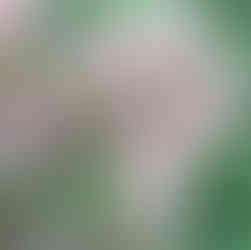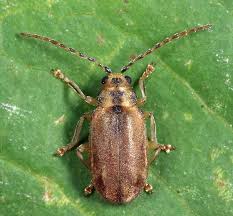Written by John Sepulveda, Certified Arborist WI-1454A
Viburnum leaf beetle, Pyrrhalta viburni, is an invasive species from Europe that infests plants in the viburnum family. Chances are you’ve seen its effects on your landscape shrubs. The beetle infests some common native viburnum such as arrowwood viburnum, American cranberry bush viburnum and black-haw viburnum. These species are more prone to infestation when under stress, and usually are not recommended for planting. Other species of viburnum have a smaller chance of being infested as they are more resistant to the beetle.
What does the viburnum leaf beetle look like?
The larvae start out greenish-yellow with dots and dashes across their bodies, then turn grayish-brown with more prominent markings as they mature to the final stages. After pupation, the adult will be about a quarter of an inch in length and will have a brownish color to its body. The adults will then continue to eat the viburnum and then lay their eggs in twigs and cover them with a mucus and excrement cap to protect them for the winter.
How does it damage plants?
The larval stage of the beetle will do a great amount of damage to the plant by eating the soft tissue on the leaves and leaving a skeleton-looking web. The adults simply eat the leaves, leaving an oval shaped hole where they have bitten. All of this injury to the leaves can end up compounding and causing leaf loss. If left unchecked, the beetle can cause an early death for your viburnum with successive seasons of defoliation.


Is there any way to stop them?
Once an infestation is suspected, a certified arborist can confirm it and provide options for care or replacement of your viburnum. If pesticides are chosen, a Hoppe Plant Health Care technician can apply insecticide that will kill the larvae. The insecticide is applied after the viburnum flowers to reduce risks to pollinators.
If you noticed leaf damage on your viburnums last fall, or you’d like a plant health check-up for your landscape, get in touch with us today. Call 414.257.2111 to schedule an inspection. Our certified arborists are experts in diagnosing insect and disease issues, and can provide recommendations for treatment and prevention.
sources:
https://biocontrol.entomology.cornell.edu/predators/ladybeetles.php







Comments